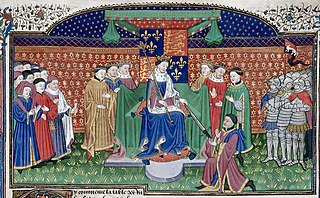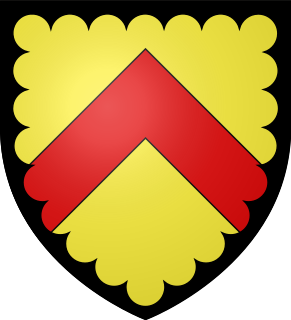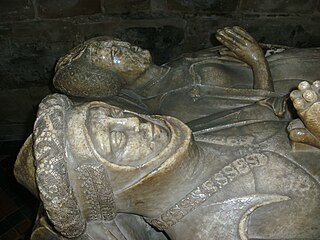
Richard Woodville, 1st Earl Rivers was an English nobleman, best remembered as the father of Queen consort Elizabeth Woodville and the maternal grandfather of Edward V and the maternal great-grandfather of Henry VIII.

Edward Stafford, 3rd Duke of Buckingham was an English nobleman. He was the son of Henry Stafford, 2nd Duke of Buckingham, and Katherine Woodville, and nephew of Elizabeth Woodville and King Edward IV. Thus Edward Stafford was a first cousin once removed of King Henry VIII. He was convicted of treason and executed on 17 May 1521.

John Stafford was a medieval English prelate and statesman who served as Lord Chancellor (1432–1450) and as Archbishop of Canterbury (1443–1452).
Elizabeth Stafford was an English noblewoman.

Anne Hastings, Countess of Huntingdon was the daughter of Henry Stafford, 2nd Duke of Buckingham, and Lady Katherine Woodville. She was the wife of Sir Walter Herbert, and George Hastings, 1st Earl of Huntingdon, and served in the household of King Henry VIII's daughter, the future Queen Mary I.

John de Vere, 12th Earl of Oxford, was the son of Richard de Vere, 11th Earl of Oxford, and his second wife, Alice Sergeaux (1386–1452). A Lancastrian loyalist during the latter part of his life, he was convicted of high treason and executed on Tower Hill on 26 February 1462.
Sir William Stafford, of Chebsey, in Staffordshire was an Essex landowner and the second husband of Mary Boleyn, who was the sister of Anne Boleyn and one-time mistress of King Henry VIII of England.

Humphrey Stafford, 1st Earl of Devon was a dominant magnate in south-western England in the mid-15th century, and a participant in the Wars of the Roses. A distant relative of the earls of Stafford, Humphrey Stafford became the greatest landowner in the county of Dorset through fortunes of inheritance. Later, Stafford was one of several men promoted rapidly through the nobility by King Edward IV, to fill the power vacuum left by dead or forfeit Lancastrians. In the West Country it was particularly the forfeitures of the Lancastrian Courtenay family that benefited Stafford. In 1469 he received the Courtenay title of Earl of Devon.

Robert Willoughby, 1st Baron Willoughby de Broke, de jure 9th Baron Latimer, KG, of Brook, in the parish of Heywood, near Westbury in Wiltshire, was one of the chief commanders of the royal forces of King Henry VII against the Cornish Rebellion of 1497.

Sir John Fogge (c.1417–1490) was an English courtier, soldier and supporter of the Woodville family under Edward IV who became an opponent of Richard III.

Grafton Manor was established before the Norman Conquest. Grafton means "settlement at or near the wood" and may indicate a role in woodland management within a larger estate, for instance.
Humphrey Stafford may refer to:

Sir Richard Vernon was an English landowner, MP and speaker of the House of Commons.
Alverstone Manor is a manor house in Alverstone in the parish of Brading on the Isle of Wight.
Sir Humphrey Stafford of Grafton Manor in Worcestershire, was an English nobleman who took part in the War of the Roses on the Yorkist side. He was executed by Henry VII following his fighting for Richard III and his role in the Stafford and Lovell rebellion.

Sir Humphrey Stafford, KG, of Southwick, Wiltshire; Hooke, Dorset; and Bramshall, Staffordshire, was a member of the fifteenth-century English gentry. He held royal offices firstly in the county of his birth, and later in the west country, particularly Devon and Dorset, and has been called 'one of the wealthiest commoners in England' of the period.
Sir Humphrey Stafford of Grafton in Worcestershire, was a prominent member of the fifteenth-century English gentry in Worcestershire, for which county he was Member of the English Parliament in 1415.

Sir Humphrey Stafford"With the Silver Hand", of Hooke in Dorset and of Southwick in the parish of North Bradley in Wiltshire was a member of the English gentry in the south west of England, where he was a Member of Parliament multiple times and an important royal official.

John Twynyho of Cirencester, Bristol and Lechlade, all in Gloucestershire, was a lawyer and wealthy wool merchant who served as Recorder of Bristol, as a Member of Parliament for Bristol in Gloucestershire in 1472-5 and in 1484 and for the prestigious county seat Gloucestershire in 1476. In 1478 he was Attorney General to Lord Edward, eldest son and heir of King Edward IV.

Sir Humphrey Stafford, of Grafton in the parish of Bromsgrove, Worcestershire, was an English nobleman who served as Governor of Calais.












